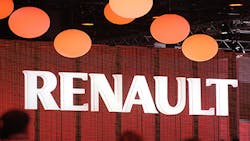Shares in Renault plunged Thursday after fraud investigators accused the carmaker of having cheated on pollution tests for diesel and petrol engines for more than 25 years with the knowledge of top management.
“The entire chain of management” up to the French firm’s CEO Carlos Ghosn was implicated in the “fraudulent strategies,” according to a report by anti-fraud agents which was seen by AFP Wednesday. (Renault is part-owned by the French government, which holds just under 20% in the carmaker.)
Renault shares were down 3.3% in early afternoon Paris stock exchange dealings, at 79.48 euros ($85.33), having early fallen by more than four percent. This added to the previous day’s 3.7% drop.
Shares in fellow French manufacturer Peugeot were also down, by a much more modest 0.9%, in an overall firmer market.
Renault categorically denied the accusations.
“Renault doesn’t cheat,” Thierry Bollore, the French company’s second-in-command told AFP by telephone late Wednesday, saying all its cars complied with legal standards.
In a separate statement released Thursday, Renault said “none of its services has breached European or national regulations related to vehicle homologations,” or certification, and that it would fully cooperate with an ongoing official investigation launched in January. “Renault vehicles are not equipped with cheating software affecting anti-pollution systems,” it said.
The fraud squad report said there was no evidence of Ghosn having charged anybody else with approving the company’s emissions control decisions, which therefore ultimately came under “his responsibility.”
“Many vehicles” were fitted with the device which allowed cars under testing to appear cleaner than they were on the road, the report said.
The accusations against Renault come after Europe’s biggest carmaker, Volkswagen, admitted to fitting 11 million cars with devices allowing them to fool emission tests. In January, Volkswagen agreed to plead guilty and pay $4.3 billion in criminal and civil fines to settle charges that it defrauded the United States and conspired to violate the Clean Air Act. This added to the $17.5 billion that the company already agreed to pay in settlements with car owners and dealers for environmental cleanup.
Renault would not likely face a similar scenario, as it sells no cars in the United States.
Volkswagen lost nearly half of its market capitalization when the emissions scandal escalated, noted David Cheetham at London-based brokerage XTB. While such a meltdown was “improbable” in Renault’s case, the French carmaker still has reason to worry about the reaction of investors, he said.
“Even though the stock is lower by around eight percent in recent sessions there could be more downside ahead,” Cheetham said.
France started investigating after some of Renault’s models, along with those from other carmakers, were found to spew out too many harmful emissions in random tests under real-world conditions last summer.
Experts running the probe said they could not rule out other carmakers besides Volkswagen using cheating devices in test conditions. Anti-fraud detectives then got on the case, leading to the latest report.
According to French consumer law, proof of fraud could lead to fines for Renault of up to 3.58 billion euros ($3.84 billion), the report said. This is, incidentally, almost exactly the size of the company’s net profit in 2016.
Investigations are also ongoing in other countries. On Wednesday, state prosecutors in southern Germany said they had searched offices belonging to carmaker Audi over parent company Volkswagen’s cheating scandal. Investigators from Bavaria, Baden-Wuerttemberg and Lower Saxony states searched “sites belonging to Audi AG and seven other locations” on suspicion of “fraud and illegal advertising”, Munich prosecutors said in a statement.
In January, Fiat Chrysler also came under fire when U.S. authorities accused it of cheating emissions tests on diesel trucks and SUVs.
Copyright Agence France-Presse, 2017
About the Author
Agence France-Presse
Copyright Agence France-Presse, 2002-2025. AFP text, photos, graphics and logos shall not be reproduced, published, broadcast, rewritten for broadcast or publication or redistributed directly or indirectly in any medium. AFP shall not be held liable for any delays, inaccuracies, errors or omissions in any AFP content, or for any actions taken in consequence.
